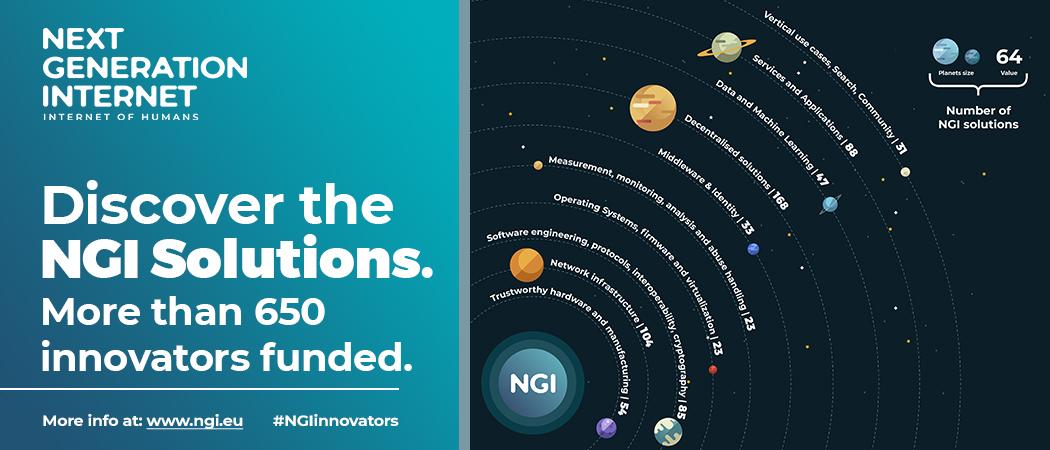Next Generation Internet initiative unveils a catalogue of innovative and trustworthy solutions

After three years of operation, the Next Generation Internet (NGI) initiative is delivering concrete solutions across a wide range of technology areas. More than 500 of these solutions are now accessible through an online catalogue, presenting hardware and software to build an Internet that fosters diversity, decentralisation and inclusivity.
Established by the European Commission, the Next Generation Internet (NGI) aims to shape the Internet so that it responds to people’s fundamental needs, including trust, security and inclusion, while reflecting the values and the norms citizens enjoy in Europe.
The solutions in the catalogue are all financed through NGI, which has so far engaged more than 1,000 innovators. Thanks to the NGI funding mechanism, innovators are able to easily access small and medium sized grants, mentorship and markets. Many work with open source solutions and would otherwise struggle to find time or funding to pursue their endeavour. Their solutions are designed to overcome the limitations of today’s Internet by addressing challenges around data ownership and privacy concerns.
Some examples of innovative solutions available in the catalogue include:
- PeerTube, an open source free and decentralised alternative video sharing platform which was designed at the Netherlands Institute for Sound and Vision, to manage one of the largest digitalised media archives in the world.
- The ORATORIO project to deliver a trusted energy data hub. End-users can safely and easily store and share their data with their preferred energy services providers.
- IRMA is a mobile app for identity management that resembles a digital wallet.
- CryptPad is a suite of private-by-design collaboration tools, which share rich text, spreadsheets, polls, presentations, whiteboard functions and code. A welcome tool for remote working.
The new catalogue includes a broad range of technology building blocks that can be used in any sector, from health, energy, supply chains and research to responsible media platforms. The searchable catalogue is designed to enable the quick discovery of results covering a wide variety of cutting-edge technologies, in the following categories:
- Trustworthy hardware and manufacturing
- Network infrastructure, including routing, peer-to-peer and virtual private networking
- Software engineering, protocols, interoperability, cryptography, algorithms, proofs
- Operating systems, firmware and virtualization
- Measurement, monitoring, analysis and abuse handling
- Middleware and identity
- Decentralised solutions, including blockchain and distributed ledger technologies
- Data and machine learning
- Services and applications such as email, instant messaging, video chat and collaboration.
- Vertical use cases, improving search and discovery and community building
The new catalogue also allows the NGI solutions to be easily identified by country, keyword, status and the NGI intermediary project that selected and funded it.
About the Next Generation Internet (NGI) initiative
Next Generation Internet (NGI) is a European Commission initiative that aims to shape the development of the Internet into an Internet of humans. NGI unites a vibrant community of Internet innovators and stakeholders around a common goal: building an Internet that responds to people’s fundamental needs, including trust, security and inclusion, and reflects the values and the norms that we enjoy in Europe.
Initial EC investment in NGI research and innovation of more than €250m (2018-2020) has already supported more than 1,000 Internet researchers and innovators involved in many hundreds of projects. Support goes beyond financing, to mentoring and the journey from an idea to a real business.
The EC announced renewed EU funding for NGI under Horizon Europe. For the period 2021-2022, the EC is dedicating €62m to support top Internet innovators in the areas of trust and data sovereignty on the Internet; trustworthy open search and discovery; Internet architecture and decentralised technologies; as well as enhanced EU-US and EU-Canada cooperation and collaboration.




 A unique international forum for public research organisations and companies to connect their external engagement with strategic interests around their R&D system.
A unique international forum for public research organisations and companies to connect their external engagement with strategic interests around their R&D system.